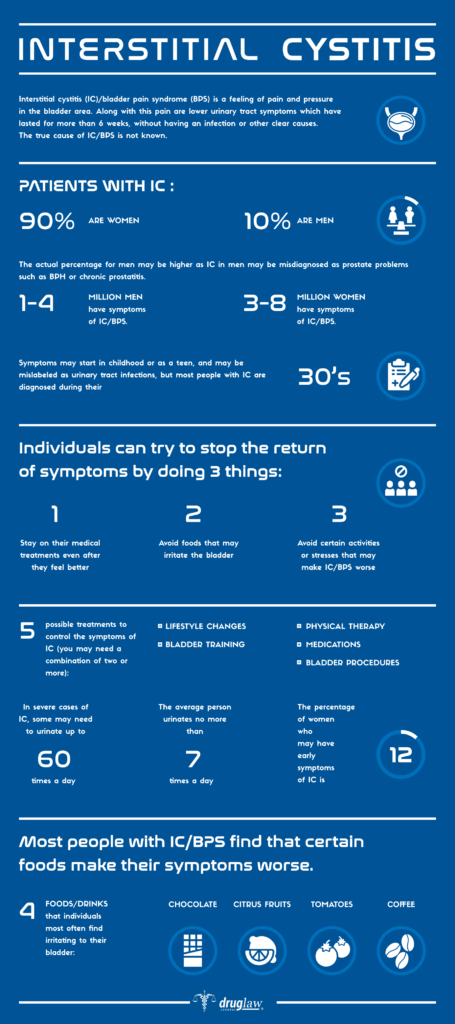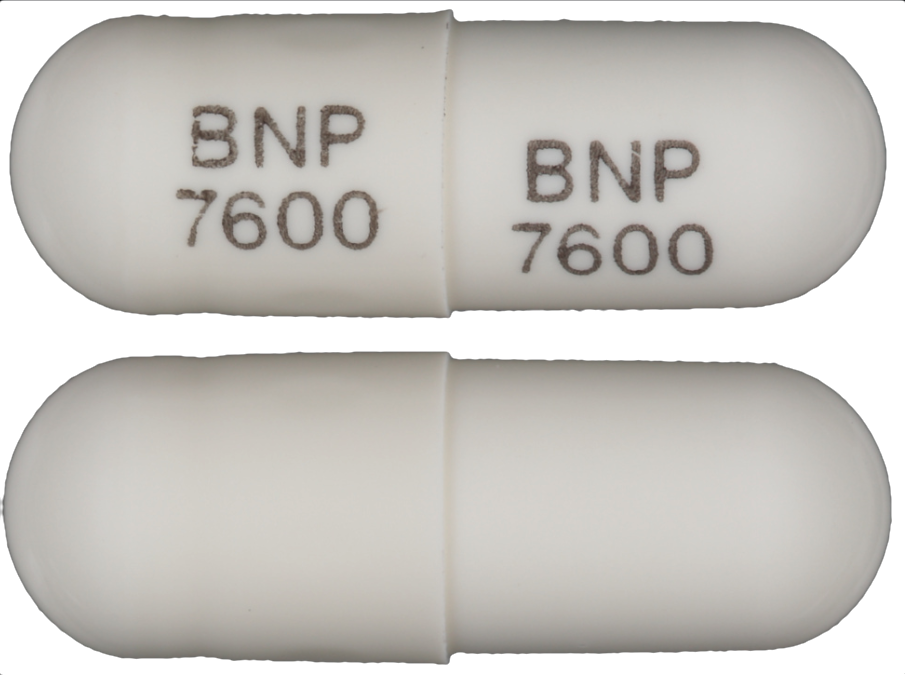Elmiron is the market name for the drug pentosan polysulfate sodium. It is the only oral drug approved specifically by the U.S. Food and Drug Administration (FDA) for the treatment of interstitial cystitis, chronic inflammation of the bladder which can result in frequent as well as painful urination. Interstitial cystitis is widely regarded as disabling due to the amount of pain and discomfort it causes in sufferers.
This drug’s mechanical method of action is unknown. However, it is believed that Elmiron works by repairing injured tissue in the wall of the human bladder. The surface of the bladder wall is typically coated with a thin layer of mucus which serves as a protection against bacteria and other inflammatory agents. In patients suffering from interstitial cystitis, this layer is compromised causing substantial irritation. Medical professionals believe that Elmiron works as a substitute barrier layer, providing some relief from irritation.
Elmiron is taken orally and usually in conjunction with other treatments such as painkillers, antihistamines, antidepressants, and “bladder instillations” such as dimethyl sulfoxide (DMSO) and Hyaluronic Acid (Cystistat). Elmiron is only available by prescription.
Manufactured by Janssen Pharmaceuticals, the European subsidiary of global drug and device manufacturer, Johnson and Johnson, Elmiron was first approved by the FDA in 1996 as a tool to combat interstitial cystitis. However, in the years following its introduction, researchers have identified what they believe is a link between Elmiron and a degenerative eye condition known as Retinal Maculopathy. This condition can result in total vision loss or impairment.
In June 2020, the FDA announced a label change for Elmiron covering risks and issues associated with vision impairment. Specifically, the revised label addressed warnings and precautions associated with irreversible “retinal pigmentary changes”. The label also suggests that all Elmiron patients receive a baseline retinal examination within six months of commencing an Elmiron regimen and that if pigmentary changes develop, continued use of Elmiron should be reevaluated.
Prescription Name and Overview
Elmiron is the brand name for the drug pentosan polysulfate sodium. It is used for the treatment of interstitial cystitis, an inflammatory condition in the bladder wall that causes frequent urination and issues with pelvic pain. Elmiron bears some similarities to the blood thinner heparin – a common blood thinner. Elmiron is only available with a prescription.
Generic Name and Overview
Pentosan Polyfulfate Sodium (Note: Elmiron is not available in a generic equivalent)
Manufacturer and Labeling Overview
Elmiron (pentosan polysulfate sodium)
Janssen Pharmaceuticals (Beerse, Belgium)
Johnson & Johnson (parent company)
Labeled Indications
Elmiron is indicated for the relief of bladder pain or discomfort associated with interstitial cystitis.
Typical Dosages
Elmiron is taken orally. The recommended dose for Elmiron is 100mg three (3) times daily. It is recommended that patients prescribed Elmiron take doses at least one hour before meals or two hours following. Patients on an Elmiron regimen are typically evaluated by their physician following three months to evaluate the success of treatment.
What Is It Used For?
Elmiron is used for the treatment of interstitial cystitis, a chronic bladder condition that results in recurring discomfort or pain in the bladder and surrounding pelvic region.

Common Symptoms of Interstitial Cystitis
- Adbdominal or Pelvic Mild Discomfort
- Frequent Urination
- A Feeling of Urgency to Urinate
- Feeling of Abdominal or Pelvic Pressure
- Tenderness
- Intense Pain in the Bladder or Pelvic Region
- Severe Lower Abdominal Pain Associated with Filling and Emptying of the Bladder
Production Anecdotes/History
Prior to its marketing as Elmiron, the drug pentosan polysulfate sodium was submitted to the FDA in 1991 by Baker Norton Pharma, a subsidiary of the Ivax Corporation. In its application, Baker Norton sought approval for its use as a treatment for interstitial cystitis. Following a number of tumultuous years in the approval process, Elmiron was approved by the FDA in 1996.
Following approval, Baker Norton sold the rights to Elmiron to the ALZA Corporation for $75 million. ALZA was thereafter acquired by global drug and device manufacturing giant, Johnson & Johnson. The FDA approval for Elmiron was transferred to Janssen Pharmaceutical in 2008.
In 2018, researchers from the Emory Eye Center issued a report covering their concerns with Elmiron and the increased occurrence of pigmentary maculopathy, a serious condition that can result in vision loss or blindness, in patients with routine exposure to the drug. Their report and study were later published in the Journal of Ophthalmology. Further studies since have found occurrences of pigmentary maculopathy as high as 20% in patients on long-term regimens of Elmiron. In June 2020, the FDA approved a new label for Elmiron which specifically warns patients concerning the higher risk for pigmentary maculopathy and advises them to receive routine vision testing while taking Elmiron.
Precautions
- The active ingredient in Elmiron is a “weak anticoagulant” (blood thinner). Patients have reported bleeding complications following use of Elmiron including: ecchymosis; epistaxis and gum hemorrhaging. Patients on Elmiron who plan to undergo surgeries or other invasive procedures which carry a risk of bleeding, should be evaluated for the possibility of hemorrhage.
- Patients with a history of heparin induced thrombocytopenia should exercise caution when using Elmiron.
- Alopecia (hair loss) has been associated with the use of pentosan polysulfate and heparin products.
- Elmiron should be used with caution in patients suffering with hepatic insufficiency.
Long-Term Use Considerations and Side Effects
Aside from the larger issues identified on Elmiron’s warning label, the most common side effects experienced by Elmiron patients are:
- Diarrhea
- Hair Loss
- Nausea
- Headache
- Stomach Upset or Pain
- Adbominal Pain
- Dizziness
- Depresed Mood
- Itching or Skin Rash
Drug Interactions
Patients who are prescribed Elmiron should alert their physician to any other medications or supplements they are taking. Additionally, Elmiron may react with:
- Aspirin
- Alteplase
- Anistreplase
- Clopidogrel
- Dipyridamole
- Streptokinase
- Ticlopidine
- Urokinase
- NSAIDs
FDA Warnings
Retinal Pigmentary Changes
The FDA-updated label for Elmiron contains a warning that changes in retinal pigment have been identified with the use of Elmiron and that cumulative dosing may be a risk factor. Reported visual symptoms associated with Elmiron included:
- Difficulty Reading
- Slow Adjustment to Low or Reduced Light Environments
- Blurred Vision
Patients are urged to have a baseline retinal exam prior to six months of beginning treatment on Elmiron and periodically thereafter. If pigmentary changes develop, patients and physicians should weigh the benefits of continued use of Elmiron as these changes may be irreversible. More details on the FDA’s warning and updated Elmiron label may be accessed here.

Lawsuits
Despite numerous and increasingly vocal concerns from the medical community concerning a linkage between Elmiron and vision issues, dating back to at least 2018, Janssen Pharmaceuticals refused to update or change the label for Elmiron until June 2020. The label update included a warning to physicians of the potential for retinal pigmentary-related vision impairment or loss associated with both short and long-term use of Elmiron.
The first lawsuits alleging eye damage resulting from Elmiron were filed in March 2020. Since that time over a hundred lawsuits have been filed and consolidated into multidistrict litigation (MDL-2973) before a federal court in New Jersey. The injured patients in these lawsuits allege that the manufacturer of Elmiron knew about the dangers of vision loss associated with Elmiron going as far back as 1991 (and earlier) and refused to make any changes to Elmiron’s labeling which would have warned them and their physicians.
Sources Cited (19)
1. “ELMIRON- pentosan polysulfate sodium capsule, gelatin coated” https://dailymed.nlm.nih.gov/dailymed/drugInfo.cfm?setid=c7417e03-5812-4f35-8433-6062d68420fc
2. “Safety-related Labeling Changes Approved by FDA Center for Drug Evaluation and Research” https://www.accessdata.fda.gov/scripts/cder/safetylabelingchanges/index.cfm?event=searchdetail.page&DrugNameID=2277
3. “Possible drug-induced, vision-threatening maculopathy secondary to chronic pentosan polysulfate sodium (Elmiron®) exposure” https://www.ncbi.nlm.nih.gov/pmc/articles/PMC7012292/
4. “MEDICATION GUIDE ELMIRON” https://dailymed.nlm.nih.gov/dailymed/medguide.cfm?setid=f0ba651e-3d8a-11df-8fbe-119855d89593
5. “Immunomodulatory activity of orphan drug Elmiron® in female B6C3F1/N mice” https://www.ncbi.nlm.nih.gov/pmc/articles/PMC4080314/
6. “ELMIRON®-100 MG (PENTOSAN POLYSULFATE SODIUM)CAPSULES PRESCRIBING INFORMATION” https://www.accessdata.fda.gov/drugsatfda_docs/label/2020/020193s014lbl.pdf
7. “ELMIRON® (pentosan polysulfate sodium) and Interstitial Cystitis (IC)” https://www.orthoelmiron.com/hcp/elmiron-for-ic
8. “Pentosan Polysulfate Maculopathy” https://www.retinalphysician.com/issues/2019/september-2019/pentosan-polysulfate-maculopathy
9. “ Elmiron Generic Name(S): pentosan polysulfate sodium” https://www.webmd.com/drugs/2/drug-14085/elmiron-oral/details
10. “What is pentosan, and how does it work (mechanism of action)?” https://www.medicinenet.com/pentosan/article.htm#what_is_pentosan_and_how_does_it_work_mechanism_of_action
11. “Elmiron Pentosan polysulfate sodium” https://www.nps.org.au/medicine-finder/elmiron-capsules
12. “The Only Oral Medication FDA Approved to Treat the Bladder Pain or Discomfort of Interstitial Cystitis (IC)” https://www.orthoelmiron.com/patient/about-elmiron
13. “More evidence linking common bladder medication to a vision-threatening eye condition” https://www.sciencedaily.com/releases/2019/10/191012141218.htm
14. “Pentosan Polysulfate Sodium (Oral Route)” https://www.mayoclinic.org/drugs-supplements/pentosan-polysulfate-sodium-oral-route/description/drg-20065410
15. “What is Interstitial Cystitis (IC)?” https://www.cdc.gov/ic/index.html
16. “Interstitial Cystitis (Painful Bladder Syndrome)” https://www.niddk.nih.gov/health-information/urologic-diseases/interstitial-cystitis-painful-bladder-syndrome
17. “Possible drug-induced, vision-threatening maculopathy secondary to chronic pentosan polysulfate sodium (Elmiron®) exposure” https://www.ncbi.nlm.nih.gov/pmc/articles/PMC7012292/
18. “Analysis of long-term Elmiron therapy for interstitial cystitis” https://pubmed.ncbi.nlm.nih.gov/9146008/
19. “New Study Adds Concern That Medication To Treat Painful Bladder Condition Linked To Vision-Threatening Eye Condition” https://www.forbes.com/sites/robertglatter/2019/10/17/new-study-adds-concern-that-medication-to-treat-painful-bladder-condition-linked-to-vision-threatening-eye-condition/?sh=5a7825551bf6


